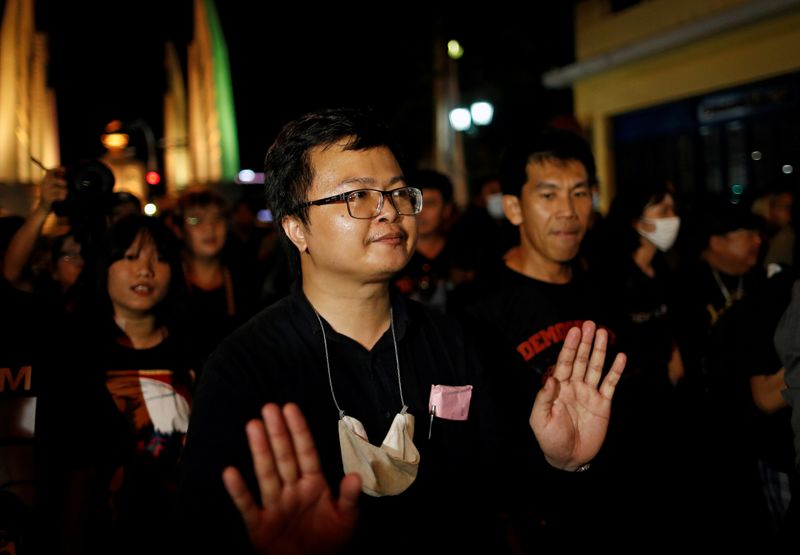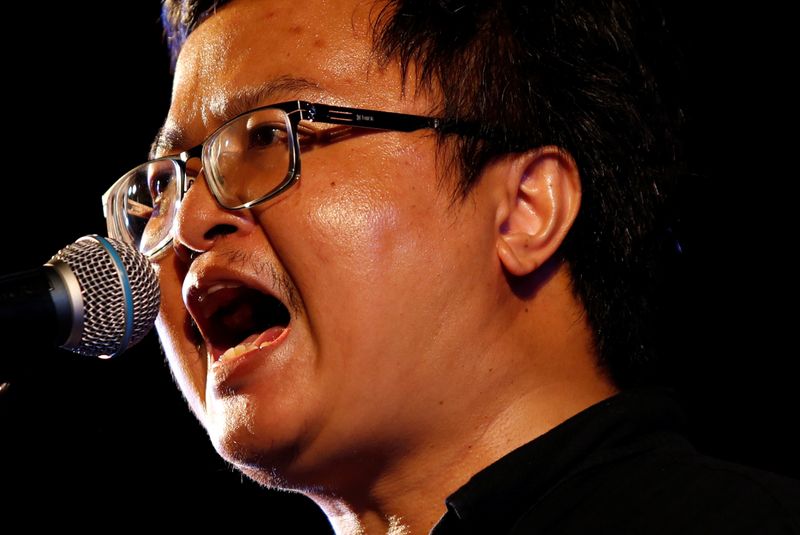BANGKOK (Reuters) – The deafening cheer for Anon Nampa at Thailand’s biggest demonstration in years underlined the bookish human rights lawyer’s emergence at the forefront of a youth protest movement with his taboo-breaking call for reforms to the monarchy.
“He looks quite harmless,” Rangsiman Rome, a former activist who is now an opposition member of parliament, told Reuters.
“But once he gets the microphone and gets on stage or starts working, he becomes a different, serious person.”
Although the protest movement has no single leader, Anon’s Aug. 3 call for curbs on the power of the monarchy shook Thai politics in a way not known in living memory and made him a hero for some and a hate figure for others.
His open challenge put Anon at risk of arrest under “lese majeste” charges, which can mean 15 years in jail.
“I think there is a need for everyone to be able to talk about the monarchy openly and constructively,” Anon told Reuters. “I think society is becoming more open about this.”
The Royal Palace did not comment on Anon or on the protesters’ demands for change when contacted by Reuters. Prime Minister Prayuth Chan-ocha has said the king requested that nobody be prosecuted for lese majeste for now.
Anon was arrested within days of his call for reform of the monarchy, though on unrelated charges linked to earlier demonstrations, fuelling the protest movement as supporters rallied at the police station before he was freed on bail.
Other student groups, meanwhile, followed up with a 10-point demand for reforms to King Maha Vajiralongkorn’s monarchy as the topic has gone from something discussed only in whispers to a regular theme at protests.
“We dream of a monarchy that coexists with democracy,” Anon said to cheers from a crowd of more than 10,000 people in Bangkok on Sunday, Thailand’s biggest protest in years.
“We must achieve this within our generation.”
Such comments infuriate royalists.
“His action breaches good morals and degraded the honour and prestige of the profession,” said Apiwat Kantong, an adviser in the prime minister’s office who has filed legal complaints against Anon in a private capacity.
“His name should be removed from the bar registration as soon as possible,” he said. Thailand’s Lawyers Council did not comment on Apiwat’s request to take this action.
At 35, Anon is older than most of the student protesters he advises. He draws on his experience of an earlier round of protests and years of court appearances to defend government critics.
FARMING FAMILY
Anon grew up in a farming family in the poor, rice-growing northeastern province of Roi Et, where opposition to the Bangkok-based establishment runs deep.
His activism began in high school and he started working in human rights in 2006, the year that elected populist leader Thaksin Shinawatra was overthrown in a military coup.
Once Anon qualified as a lawyer in Bangkok, he saw his mission as defending society’s weakest.
“Many cases he took are victims of harassment who nobody knows,” said Krisadang Nutcharat, another human rights lawyer.
In 2010, Anon set up a legal practice to help those affected by bloody clashes between Thaksin’s supporters and the authorities.
After the then army chief Prayuth seized power in a 2014 coup, Anon took on cases of political activists – including those who had been charged with lese majeste offences against the monarchy.
“In many cases, the accused spoke truthfully but the things they said are unacceptable for society at large … The court still ruled that they are guilty,” Anon said. “This is why I became interested in the monarchy.”
The reforms Anon seeks to the monarchy include reducing the king’s constitutional powers, which were expanded after he succeeded his late father in 2016, and dropping the lese majeste laws.
As Anon stepped up his political activism after the 2014 coup, so the arrests began. In 2015, he was charged with organising a banned political gathering.
Including the most recent arrest, he has been charged 13 times. Of the six cases that have concluded, three were thrown out and he faced fines totalling 2,200 baht ($70) over the others. Seven cases are pending, including some for protests in 2018 to demand fair elections.
Critics accuse Prayuth of keeping power in elections last year by benefiting from electoral rules shaped by the army that helped him win. He has said the vote was fair.
With a passion for history and literature, some of Anon’s inspiration – and the picture on his Twitter profile – is from 1950s-era Marxist historian and activist Chit Phumisak, whose publications include “The Real Face of Thai Feudalism”.
In his spare time, Anon writes poetry – much of it politically inspired. One line he wrote in the aftermath of the bloodshed in 2010 reads: “With red flag raised and bravely challenging, come comrades, revolt and topple this thievish state.”
(Editing by Matthew Tostevin, Robert Birsel)
























